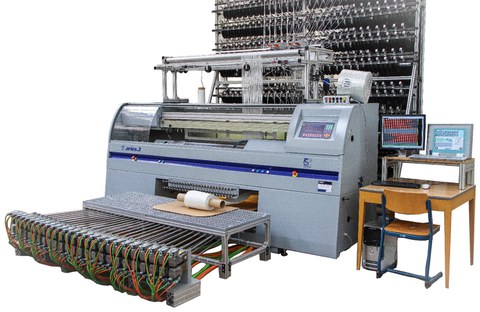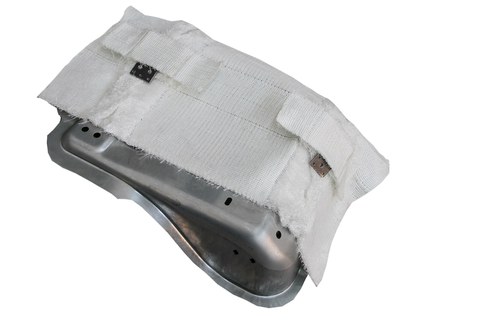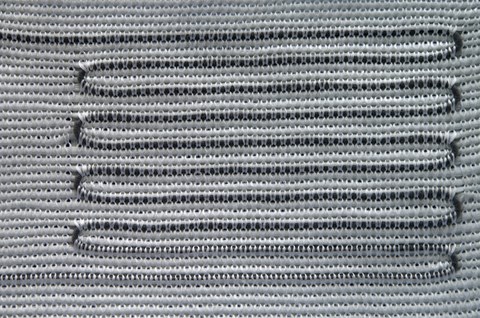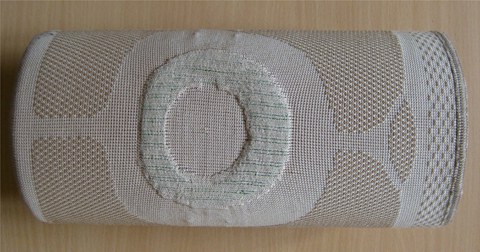2D- & 3D-Stricken

Flachstrickmaschine zur Herstellung endkonturgerechter Mehrlagenflachgestricke
Die Entwicklung bzw. Anpassung textiler Verfahren für die direkte Herstellung komplex geformter 2D- und 3D-Funktionsstrukturen für verschiedenste Anwendungen ist am ITM seit langem ein wichtiger Forschungsschwerpunkt. Insbesondere die Flachstricktechnik weist ein sehr hohes Potenzial für die Realisierung derartiger hochfunktionaler, beanspruchungs- und endkonturgerechter textiler Halbzeuge auf.

FKV-Demonstrator auf Basis endkonturgerechter Mehrlagenflachgestricke
Eine besondere Entwicklung des ITM sind Mehrlagengestricke (MLG) als textile Verstärkungshalbzeuge für Faserkunststoffverbunde (FKV) mit in der Maschenstruktur integrierten, gestreckt angeordneten Verstärkungsfäden. Neben einer biaxialen (0°,90°) sind auch multiaxiale (zwischen 0° und 90°) Anordnungen der Verstärkungsfäden in der Gestrickstruktur möglich. Aufgrund der gestreckten Verstärkungsfadenlagen sind MLG hervorragend für die Herstellung hochbeanspruchbarer FKV-Bauteile geeignet.

Gestrick mit integrierten Sensorfäden
Ein übergreifendes Ziel der Forschungsarbeiten ist die Entwicklung und Etablierung einer durchgängigen und automatisierten Prozesskette, die, ausgehend von der 3D-CAD-Bauteilgeometrie über die simulationsgestützte Bauteilauslegung und Ermittlung der Verstärkungsfadenanordnung, die Erstellung der Maschinensteuerprogramme sowie die direkte Herstellung von 2D- und 3D-MLG-Preformen erlaubt.
Gegenüber den aktuell etablierten Verfahren für die Preformfertigung zeichnet sich die MLG-Technologie durch erhebliche Vorteile aus:
- endkontur- und endgeometriegerechte Herstellung textiler Halbzeuge (One-Shot-Technologien),
- Minimierung von Faserabfällen (Zero-Waste-Technologien),
- Erreichung eines hohen Funktionalisierungsgrads durch z. B. lastgerechte textile Halbzeuge über lokale Anpassung der Verstärkungswirkung und Integration von Sensoren,
- Einstellung der Impact- und Delaminationseigenschaften über den Maschenfaden als Verstärkung in z-Richtung,
- Herstellbarkeit textiler Strukturen mit je nach Anforderung über der Fläche homogener oder inhomogener Verstärkungsstrukturen sowie
- Verarbeitbarkeit von Hochleistungsfasern wie Carbon, Glas-, Basalt- oder Naturfasern sowie Hybridgarnen in allen Fadensystemen.
Darüber hinaus bestehen weitere Forschungsschwerpunkte am ITM in der Anpassung der Stricktechnologie an neue Werkstoffe bzw. zur Realisierung neuer Produkte, z. B. für die Hochleistungssektoren Medizin (u.a. Orthesen, Gefäßersatz), Brandschutz, Geo- oder Architekturtextilien bzw. verschiedenste Multi-Material-Composites.

Gestrickte Orthese mit anforderungsgerechter partieller Verstärkung mittels der MLG-Technologie
Ansprechpartner:
 © Mirko Krziwon
© Mirko Krziwon
Herr Dr.-Ing. Matthias Overberg
Generative 3D-Technologien f. Integration u. Preforming
Eine verschlüsselte E-Mail über das SecureMail-Portal versenden (nur für TUD-externe Personen).
Besuchsadresse:
George-Bähr-Straße 3c, Zeunerbau, Raum 111
01069 Dresden
